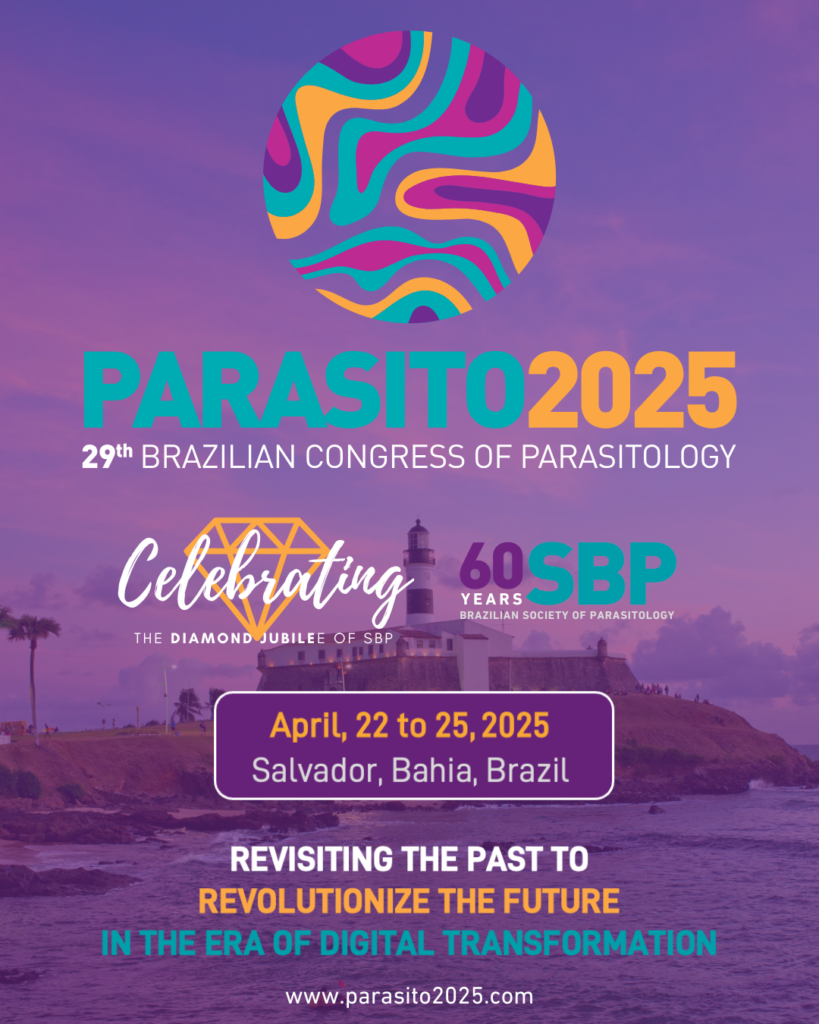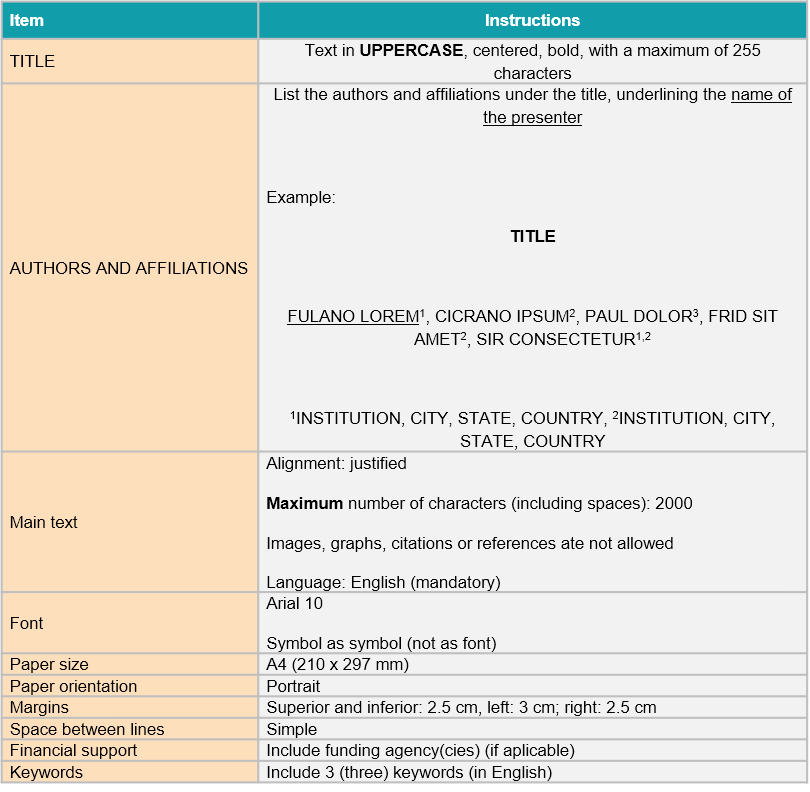
As the President of the 29th Brazilian Congress of Parasitology – PARASITO 2025, it is an honor and a privilege to extend a warm invitation to you for our upcoming congress, which will take place in the beautiful city of Salvador, Bahia, from April 22 to 25, 2025.
This congress comes at a crucial time for the field of parasitology, as we face new challenges and exciting advances in research, education, and the practical application of knowledge for the benefit of society. Our goal for this congress is to create a vibrant forum for the exchange of knowledge, ideas, and experiences among parasitologists from around the world. We have organized a scientific program that will feature world-renowned experts, presentations of cutting-edge research, and interactive discussions that inspire innovation and collaboration.
The city of Salvador, with its rich history, cultural diversity, and stunning landscapes, offers an inspiring backdrop for our congress. In addition to the scientific sessions, you will have the opportunity to experience Bahia’s warm hospitality, explore its historical sites, and enjoy its unique cuisine.
I strongly encourage your participation in this congress, whether by presenting your research, engaging in discussions, or simply connecting with other professionals. Your presence and contributions are what make our congress truly impactful, and I am confident that this event will leave a lasting mark on our community.
Please stay tuned for more details regarding registration, abstract submission, and accommodations, which will be available at www.parasito2025.com. We are committed to making this congress a rewarding and memorable experience for all participants. I look forward to welcoming you to Salvador in April 2025 for an event that promises to be scientifically enriching and personally enjoyable.
With warmest regards,
![]()
Patrícia Sampaio Tavares Veras
President of PARASITO 2025

It is with great honor and satisfaction that, as President of the Brazilian Society of Parasitology (SBP), I invite you all to participate in the 29th Brazilian Congress of Parasitology – PARASITO 2025, the SBP Biennial Meeting, an event that will have a special significance as we will also celebrate the diamond jubilee marking the 60th anniversary of SBP’s foundation.
The congress will be held from April 22 to 25, 2025, in the city of Salvador (Bahia) and will bring together researchers, professors, students, and professionals to discuss the latest scientific advances in parasitology, share experiences, and promote integration among different areas of knowledge.
Over these six decades, SBP has played a crucial role in scientific dissemination and the training of new parasitologists in Brazil. This congress will be a milestone to revisit our history, reflect on current challenges, and chart the paths for the future of parasitology in the country.
We will have a diverse program, including lectures by renowned national and international experts, thematic symposia, scientific presentations, poster sessions, and various networking opportunities. The event will also be a space to honor those who have contributed to the history of SBP and the development of science in Brazil.
We invite everyone to join us in this scientific celebration and be part of this rich exchange of knowledge and experiences. Your presence will be essential to making this event unforgettable.
We look forward to your participation!
Sincerely,

Ricardo Toshio Fujiwara
President of the Brazilian Society of Parasitology (SBP)
PARASITO 2025
In 2025, the 29th Brazilian Congress of Parasitology – PARASITO 2025 will have the theme “Revisiting the Past to Revolutionize the Future in the Age of Digital Transformation”, offering a unique opportunity for students, professors, researchers, and other professionals in the field of parasitology. The event will feature the participation of international researchers and students, with a program of global impact.
General Information of PARASITO 2025
Name: 29º Brazilian Congress of Parasitology – PARASITO 2025
Date: April 22 to 25, 2025
Local: Salvador, Bahia, Brazil
Host: PARASITO 2025 Organizing Committee
Organizers: Brazilian Society of Parasitology (SBP)
Oswaldo Cruz Foundation (Fiocruz)
Theme: Revisiting the Past to Revolutionize the Future in the Age of Digital Transformation
Website: www.parasito2025.com
Instagram, X & Facebook @parasito2025
This is an opportunity to meet scientists, professors, health professionals, non-governmental organizations, the industry, and government representatives, who will share their latest discoveries and advancements. The PARASITO 2025 Congress program includes plenary sessions and lectures with global leaders in their respective fields, round tables, and discussion forums on cross-cutting topics in parasitology, as well as courses, workshops, and an exhibitor section, providing numerous networking opportunities with different sectors of academia, industry, and government.
Brazilian Congress of Parasitology – PARASITO 2025
The Brazilian Society of Parasitology (SBP) Congress takes place every two years in different cities. SBP members can submit their applications for upcoming editions. In 2025, the city of Salvador, the capital of Bahia, was chosen to host the next edition of the event. Below, you can find the most recent cities that hosted the congress:
PARASITO 2023 Aracaju, SE, Brazil
PARASITO 2021 On-line
PARASITO 2019 Belo Horizonte, MG, Brazil
PARASITO 2017 Búzios, RJ, Brazil
In 2025, the 29th Brazilian Congress of Parasitology – PARASITO 2025 will have the theme “Revisiting the Past to Revolutionize the Future in the Age of Digital Transformation”, offering a unique opportunity for students, professors, researchers, and other professionals in the field of parasitology. The event will feature the participation of international researchers and students, with a program of global impact.
Themes and Topics
- Leishmaniasis
- Malaria
- Chagas Disease
- Schistosomiasis
- Trichomoniasis
- Amebiasis
- Biotechnology
- Entomology
- Epidemiology
- Immunopathology
- Biosensors
- Extracellular Vesicles
- Ecology of Vectors in Diseases Caused by Parasites
- Translational Biology in Helminthology
- Advances in Parasite-Host Interaction
- One-Health Approach to Chagas Disease Transmission
- Diagnosis and Blocking the Transmission of Schistosomiasis
- Clinical Aspects of Leishmaniases
- Advances in Vector Biology
- Innovative Tools for Helminth Control
- Innovative Tools for Trypanosomantid Control
Vector’s Biology in Leishmaniasis - Diagnosis and Control of Intestinal Helminthic Infections
- Advances in the Diagnosis of Leishmaniasis
- Education and Communication in Parasitology
COMMITTEES
Organizing Committee
Patrícia Veras – IGM, Fiocruz Bahia – PARASITO 2025 President
Juliana Menezes – IGM, Fiocruz Bahia – PARASITO 2025 Vice-president
Rubens L. do Monte Neto – IRR, Fiocruz Minas – PARASITO 2025 Vice-president
Ricardo Toshio Fujiwara – UFMG – President of SBP
Grasielle Caldas D’Avila Pessoa – UFMG – Vice-president of SBP
Andrey José de Andrade – UFPR – General Secretariat of SBP
Alverne Passos Barbosa – UFG – 1st Secretary of SBP
Renata Heisler Neves – UERJ – 1st Treasurer of SBP
Claudia Maria Antunes Uchôa – UFF – 2nd Treasurer of SBP
Ana Paula Lopes Vidal – SBPz – Organizer and Support
Vilma de Araújo Andrade – SBPz – Organizer and Support
Local Organizing Committee – STAFF
Patrícia Veras – IGM, Fiocruz Bahia – PARASITO 2025 President
Juliana Menezes – IGM, Fiocruz Bahia – PARASITO 2025 Vice-president
Claudia Ida Brodskyn – Instituto Gonçalo Moniz, Fiocruz Bahia
Camila Indiani de Oliveira – Instituto Gonçalo Moniz, Fiocruz Bahia
Valéria de Matos Borges – Instituto Gonçalo Moniz, Fiocruz Bahia
Lucas Pedreira de Carvalho – Instituto Gonçalo Moniz, Fiocruz Bahia
Deborah Bitencourt Mothé Fraga – Instituto Gonçalo Moniz, Fiocruz Bahia
Thamires Quadros Froes – Instituto Gonçalo Moniz, Fiocruz Bahia
Scientific Committee & Evaluation Board
Alexandre Barbosa Reis – Federal University of Ouro Preto
Alessandra Guarneri – Instituto René Rachou, Fiocruz Minas
Álvaro Gil – Instituto René Rachou, Fiocruz Minas
Ana Cristina Bahia – Universidade Federal do Rio de Janeiro
Andrea Ávila – Instituto Carlos Chagas, Fiocruz Paraná
Carlos Graef Teixeira – Universidade Federal do Espírito Santo
Carlos Henrique Nery Costa – Universidade Federal do Piauí
Claudia Brodskyn – Instituto Gonçalo Moniz, Fiocruz Bahia
Eduardo Ferreira – Fiocruz Mato Grosso do Sul
Elisa Cupolillo – Instituto Oswaldo Cruz, Fiocruz
Elvira Saraiva – Universidade federal do Rio de Janeiro
Fernando Schemelzer – Universidade Federal do Ceará
Gabriel Melim Ferreira – Fiocruz Rondônia
Gilberto Fontes – Universidade Federal de São João Del-Rei
Lia Carolina Medeiros Kuczera – Instituto Carlos Chagas, Fiocruz Paraná
Lilian Bueno – Universidade de Minas Gerais
Maria Fernanda Laranjeira – Universidade de São Paulo
Mariana Boité – Instituto Oswaldo Cruz, Fiocruz
Nágila Secundino – Instituto René Rachou, Fiocruz Minas
Nilmar Silvio Moretti – Unifesp & Université de Montréal
Osvaldo Pompílio – Instituto Aggeu Magalhães, Fiocruz Pernambuco
Roberta Caldeira – Instituto René Rachou, Fiocruz Minas
Rodrigo Pedro Soares – Instituto René Rachou, Fiocruz Minas
Rodrigo Gurgel Gonçalves – Universidade de Brasília
Tania Tasca – Universidade Federal do Rio Grande do Sul
Ulysses Lopes – Universidade Federal do Rio de Janeiro
Zulma Maria de Medeiros – Instituto Aggeu Maglhães, Fiocruz Pernambuco
Science Outreach Committee
Eduardo Caio Torres Santos – Instituto Oswaldo Cruz, Fiocruz
Cristiana Ferreira Alves de Brito – Instituto René Rachou, Fiocruz Minas
Valéria de Matos Borges – Instituto Gonçalo Moniz, Fiocruz Bahia
Ricardo Lustosa – Universidade Federal da Bahia
International Advisory Board
Christopher Fernandez-Prada – Université de Montréal, Canada
Johan Ankarklev – Stockholm University, Sweden
Shaden Kamhawi – NIH, USA
Fabiano Oliveira – NIH, USA
Honorary Committee
José Mauro Peralta – Universidade Federal do Rio de Janeiro, Former SBP President
Silvio Santana Dolabella – Universidade Federal de Sergipe, PARASITO 2023 President
Sinval Pinto Brandão Filho – IAM, Fiocruz Pernambuco, MEDTROP 2025 President
Herbert L. de Matos Guedes – UFRJ, IOC, Fiocruz, PARASITO 2027 President
Alda Maria da Cruz – Minstério da Saúde, IOC Fiocruz, PARASITO 2027 Committee
Maria Fantinatti – Universidade do Estado do Rio de Janeiro, PARASITO 2027 Committee
Eduardo Torres – Universidade do Estado do Rio de Janeiro, PARASITO 2027 Committee
Financial Committee
Ana Paula Lopes Vidal – SBPz – Organizer and Support
Vilma de Araújo Andrade – SBPz – Organizer and Support
Renata Heisler Neves – UERJ – 1st Treasurer of SBP
Claudia Maria Antunes Uchôa – UFF – 2nd Treasurer of SBP
DOWNLOAD CENTER
Book of Abstracts
Use the button bellow to download the Book of Abstracts.


Guidelines for Preparing Abstract
The abstracts must be prepared in English, containing the title, list of authors and affiliations, main text, financial support, and keywords. The abstract(s) must be submitted in .pdf format through the abstract submission system in the participant restrict area. Access to the restricted area is granted after registering for the event.

Each registered participant can submit up to 2 (two) abstracts.
Use the button below to download the Abstract template.
Guidelines for Poster
All participants who submitted and had their abstracts accepted as posters must present a printed poster during the event. Each abstract has an ID number, which will guide the presentation day. Posters with odd numbers must be presented on April 23rd, 2025, while abstracts with even numbers will be presented on April 24th, 2025. The posters must be placed on the poster boards on the morning of the presentation day. The poster presentations will take place from 6:00 p.m. to 8:00 p.m. on the above-mentioned dates.
Instructions and rules
• The poster must include the title, author names, and affiliations
• The poster title must be the same as the accepted abstract
• The poster must be written in English
• Using Arial as a reference, the font size should follow these rules: title: 70, author names: 54, affiliations: 36, subhead: 40, main text: 36, figure captions: 24 (see the poster template available for download)
• Poster dimensions: 0,90 m (width) x 1,20 m (height) with a string that allows it to be hung on the poster board
• The poster must include background and main goal, methods, results, conclusions, and acknowledgments (see the attached template)
• The presentation of the poster is mandatory
• The poster must be set up on April 23rd, 2025, starting at 9:00 am, and must remain on display throughout the congress
• Posters with odd numbers will be presented on April 23rd, 2025, while those with even numbers will be presented on April 24th, 2025
• PARASITO 2025 or SBP are not responsible for posters that were not removed at the end, misplaced, or lost
• The poster will be reviewed by one or more members of the evaluation committee previously selected by PARASITO 2025. These members may or may not identify themselves
• The evaluation criteria include the quality of the work and presentation, as well as the presenter’s ability to place the work within the relevant literature
Use the button below to download the Powerpoint Poster template.
Guidelines for Oral
All participants whose abstracts were accepted for oral presentation must deliver a talk of up to 15 minutes, followed by 5 minutes of discussion. The talk should preferably be presented in English, except for those speakers who do not feel comfortable doing so. Presentations will take place on April 23rd and 24th, 2025, from 1:30 PM to 3:30 PM. The corresponding session and time can be found by following the order of presentations listed in the Official Program available on the event website.
• Your presentation must be in English (both spoken and in slides), and the session chairs will be available to assist you if needed;
• All presentations selected for oral sessions are eligible for the Best Oral Presentation Award;
• The maximum time for your presentation is 15 minutes, followed by 5 (five) minutes for questions;
• Presenters are responsible for submitting their presentation file at least two (2) hours before the session, at the Media Desk room. You may bring it on a USB drive to be used on the available computer;
• Please be in the designated room at least 15 minutes before the session starts;
• We strongly recommend using PowerPoint (.ppt or .pptx) or Portable Document Format (.pdf) files;
• Your work has been selected for oral presentation and must not be presented as a poster. Therefore, it will not be considered for the Best Poster Award;
• Find below a PowerPoint Oral Presentation template, which is a suggestion for presentation design. Remember, the use of this template is not mandatory, but it can help to organize the slides.
Use the button below to download the Powerpoint ORAL PRESENTATION template.
Best Presentations AWARD
This year, the award for the best presentations is sponsored by PLoS Neglected Tropical Diseases/Public Library of Science and Parasites & Vectors/BioMed Central, to whom we express our gratitude for their support.
Works presented in the form of posters and oral presentations are eligible for the best presentation awards according to the following instructions and rules.
• The top 3 (three) poster presentations and the top 3 (three) oral presentations by students (undergraduate students, master’s, and doctoral levels) from any area will be awarded. This is considered the “student” category;
• For the professional/post-doc category, only the top two presentations will be awarded—one poster and one oral presentation;
• Poster evaluators will nominate the best presentations in both categories (student and professional);
• Each chair attending the oral presentation sessions will nominate the best presentations in both categories (student and professional);
• Based on the nominations from evaluators and chairs, a committee will select the winners for each category;
• The winners will receive a trophy, certificates, and prizes, which will be awarded on April 25 during the PARASITO 2025 closing ceremony.
The History Behind PARASITO 2025

